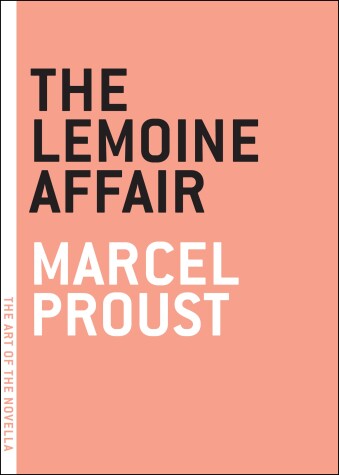Art of the Novella
1 total work
Their friend Marcel Proust had killed himself after the fall in diamond shares, a collapse that annihilated a part of his fortune.
This is the first-ever translation into English of this startling tour-de-force by one of the twentieth century’s greatest writers.
The Lemoine Affair was inspired by the real-life French scandal involving Henri Lemoine, who claimed he could manufacture diamonds from coal and convinced numerous people—including officers of the De Beers diamond mine company and Proust himself—to invest in the scheme. In a series of pastiches—imitations written in the style of other writers—Proust tells the story of the embarrassment rippling across high society Paris in the wake of the scandal, poking fun at himself (in one story, a character declares that Marcel Proust is so embarrassed he’s suicidal) while lampooning some of France’s greatest writers, including Flaubert, Balzac, and Saint-Simon.
Full of sophisticated wit and dazzling wordplay, and rife with allusions to his friend and fictional characters, many Proust scholars see the dead-on mimicry of The Lemoine Affair—written soon after Proust’s rejection of society life—as the work by which he honed his own unique, masterly voice.
The Art of The Novella Series
Too short to be a novel, too long to be a short story, the novella is generally unrecognized by academics and publishers. Nonetheless, it is a form beloved and practiced by literature's greatest writers. In the Art Of The Novella series, Melville House celebrates this renegade art form and its practitioners with titles that are, in many instances, presented in book form for the first time.
This is the first-ever translation into English of this startling tour-de-force by one of the twentieth century’s greatest writers.
The Lemoine Affair was inspired by the real-life French scandal involving Henri Lemoine, who claimed he could manufacture diamonds from coal and convinced numerous people—including officers of the De Beers diamond mine company and Proust himself—to invest in the scheme. In a series of pastiches—imitations written in the style of other writers—Proust tells the story of the embarrassment rippling across high society Paris in the wake of the scandal, poking fun at himself (in one story, a character declares that Marcel Proust is so embarrassed he’s suicidal) while lampooning some of France’s greatest writers, including Flaubert, Balzac, and Saint-Simon.
Full of sophisticated wit and dazzling wordplay, and rife with allusions to his friend and fictional characters, many Proust scholars see the dead-on mimicry of The Lemoine Affair—written soon after Proust’s rejection of society life—as the work by which he honed his own unique, masterly voice.
The Art of The Novella Series
Too short to be a novel, too long to be a short story, the novella is generally unrecognized by academics and publishers. Nonetheless, it is a form beloved and practiced by literature's greatest writers. In the Art Of The Novella series, Melville House celebrates this renegade art form and its practitioners with titles that are, in many instances, presented in book form for the first time.
